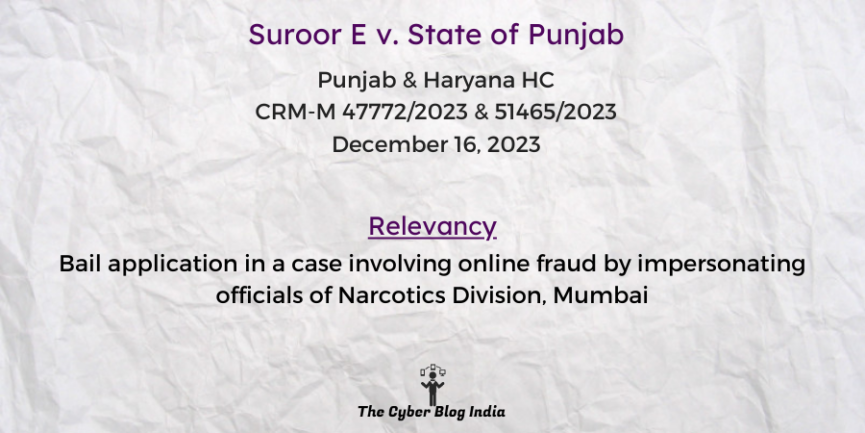Suroor E v. State of Punjab

Suroor E v. State of Punjab
In the High Court of Punjab & Haryana
CRM-M 47772/2023 & 51465/2023
Before Justice Manjari Nehru Kaul
Decided on December 16, 2023
Relevancy of the case: Bail application in a case involving online fraud by impersonating officials of Narcotics Division, Mumbai
Statutes and Provisions Involved
- The Information Technology Act, 2000 (Sections 66C, 66D)
- The Indian Penal Code, 1860 (Sections 383, 384, 420 466, 468, 470, 471, 506, 120B)
Relevant Facts of the Case
- Individuals impersonating officials of the Narcotics Division, Mumbai, defrauded the complainant and extorted over ₹62 lakhs.
- Allegedly, ₹2.7 lakhs from the extorted amount were transferred in the name of the first petitioner. He later handed over the amount to the second petitioner.
- The petitioner had filed this bail application after his arrest on August 11, 2023.
Prominent Arguments by the Advocates
- In CRM-M 47772/2023, the first petitioner’s counsel argued that the police had falsely implicated him. The FIR did not mention his name nor attribute any role to him. Moreover, the disclosure statement made by the co-accused stating his name had weak evidentiary value. Additionally, the petitioner had no contact with the complainant and did not own the bank account mentioned in the FIR.
- In CRM-M, 51465/2023, the second petitioner’s counsel also submitted that the police had falsely implicated the second petitioner. The FIR did not mention his name or attribute any role to him. Further, the contact number mentioned in the FIR did not belong to him, and he did not receive any money.
- The respondent’s counsel submitted that the petitioners were part of a duping gang operating from Kerala. They could abscond if the court granted them bail at the instant stage, before the framing of charges and presentation of the prosecution’s evidence.
Opinion of the Bench
- Considering the facts and circumstances, the nature of the allegations, and the expansive extent of the alleged illegal activities of online fraud, the petitioners do not deserve a bail concession.
Final Decision
- The bench rejected the bail application without commenting on the case’s merits.
Jyotsna Sood, an undergraduate student at the National Law Institute University, Bhopal, prepared this case summary during her internship with The Cyber Blog India in May/June 2024.
